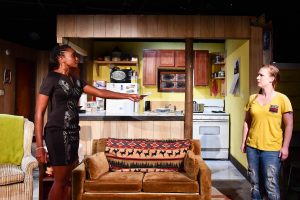A MASON/DIXON CATHARSIS REPRISES ITS SUCCESS
Can white trash/peckerwood/country cracker/Dixie doodles rise above their rotten roots? Byhalia, Mississippi is not just a place or a title but a condition’”a backwater hamlet with none of the sophistication, joie de vivre or cosmopolitan culture of Jackson, the nearby dumbass state capital. A 2015 Jefferson Award-winning world premiere at Den Theatre, this co-production by The New Colony and Definition Theatre Company delivers several stunning Southern caricatures, all but begging a Yankee audience to dismiss them with condescending complacency. Then it works overtime to subvert the stereotypes. Byhalia, Mississippi is actor-author Evan Linder’s bittersweet salute to both down-home decency and a troubled couple living in a see-through shack.
Working in the local school, Laurel Parker (Liz Sharpe, powerfully present) is the very pregnant, semi-literate wife of Walmart worker Jim (author Linder, just 40 I.Q. points away from Deliverance). Two years married and living on T.V. dinners, both are no better off than tomorrow’s paycheck. (Savings are a pipe dream.) Offering her more advice than wisdom, her mother Celeste (Cecilia Wingate, solid and stolid) is skilled at getting in the way.
Not to give much more away, Laurel has her baby but it clearly isn’t Jim’s. A tale that seems tabloid trashy and soap operatic, with bottom-feeding ugliness to spare, suddenly verges on classical tragedy. Racism, of course, rears its ugly head because this dump is defined by its differences. What’s unexpected and awesomely admirable is Laurel’s response, one guaranteed to divide a crowded house or even a single onlooker. Do we throw brickbats or howl our approval? Intentionally or not, Linder’s depiction’”and Sharpe’s portrayal–of this stubborn survivor recalls Nora, the “doll wife” who walks out on her family in Ibsen, as well as Nathaniel Hawthorne’s Hester Prynne, who defies a small town’s smaller soul. It’s both more and less than we ever expected.
Remounting the 135-minute drama with the original cast in Steppenwolf’s intimate 1700 Theatre, Tyrone Phillips immerses the audience in the dead-end details of delta denizens–scrounging, sacrificing and too busy to hope. Completing the cast are the African-American neighbors, Carl (Jeffery Owen Freelon Jr.), Jim’s childhood chum (not that that’s a claim to friendship), and prosperous Ayesha (Kiki Layne), collateral damage in this Solomonic story.
Their palpably complex performances–sharp-edged, unexpectedly nuanced, and documentary-believable’”are nonetheless marred and blunted by this quintet’s failure to project. Whether it’s an intentional refusal to succumb to the cliche of loud-mouthed, leather-lunged Southern losers a la Gomer Pyle, the actors indulge in a mumbling, mush-mouthed, Method-y delivery that, considering the secrets they don’t share, is more or less maddening. (Another drawback: In a misguided pretense to protect the environment, patrons get no programs, recyclable or otherwise–an insult to the artists that I hope creates no precedent.)
A cynic could argue that the success of Byhalia, Mississippi comes from more than just the perfect marriage of actor to role and dialogue to character. The play heavily mines liberal guilt’”specifically, progressives’ prejudices against the poor–for all it can get. If the audience were to think beyond the play’s satisfying ending with its welcome wishful thinking, they’d realize that the Parkers’ crises are far from over. The future is not their friend. Let’s not kid ourselves: Byhalia remains Byhalia and Mississippi Mississippi. But, nonetheless, however, notwithstanding–what happens here is not altogether impossible.
photos by Evan Hanover
Byhalia, Mississippi
The New Colony and Definition Theatre Company
part of Steppenwolf’s Visiting Company Initiative
Steppenwolf’s 1700 Theatre, 1700 N. Halsted St.
ends on August 21, 2016
for tickets, call 312.335.1650 or visit Steppenwolf








